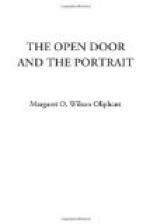“I was stopped outside the gate to-day by a curious sort of petitioner,—a poor woman, who seems to be one of your tenants, sir, but whom your agent must have been rather too hard upon.”
“My agent? Who is that?” said my father quietly.
“I don’t know his name, and I doubt his competence. The poor creature seems to have had everything taken from her,—her bed, her child’s cradle.”
“No doubt she was behind with her rent.”
“Very likely, sir. She seemed very poor,” said I.
“You take it coolly,” said my father, with an upward glance, half-amused, not in the least shocked by my statement. “But when a man, or a woman either, takes a house, I suppose you will allow that they ought to pay rent for it.”
“Certainly, sir,” I replied, “when they have got anything to pay.”
“I don’t allow the reservation,” he said. But he was not angry, which I had feared he would be.
“I think,” I continued, “that your agent must be too severe. And this emboldens me to say something which has been in my mind for some time”—(these were the words, no doubt, which I had hoped would be put into my month; they were the suggestion of the moment, and yet as I said them it was with the most complete conviction of their truth)—“and that is this: I am doing nothing; my time hangs heavy on my hands. Make me your agent. I will see for myself, and save you from such mistakes; and it will be an occupation—”
“Mistakes? What warrant have you for saying these are mistakes?” he said testily; then after a moment: “This is a strange proposal from you, Phil. Do you know what it is you are offering?—to be a collector of rents, going about from door to door, from week to week; to look after wretched little bits of repairs, drains, etc.; to get paid, which, after all, is the chief thing, and not to be taken in by tales of poverty.”
“Not to let you be taken in by men without pity,” I said.
He gave me a strange glance, which I did not very well understand, and said abruptly, a thing which, so far as I remember, he had never in my life said before, “You’ve become a little like your mother, Phil—”
“My mother!” the reference was so unusual—nay, so unprecedented—that I was greatly startled. It seemed to me like the sudden introduction of a quite new element in the stagnant atmosphere, as well as a new party to our conversation. My father looked across the table, as if with some astonishment at my tone of surprise.
“Is that so very extraordinary?” he said.
“No; of course it is not extraordinary that I should resemble my mother. Only—I have heard very little of her—almost nothing.”




